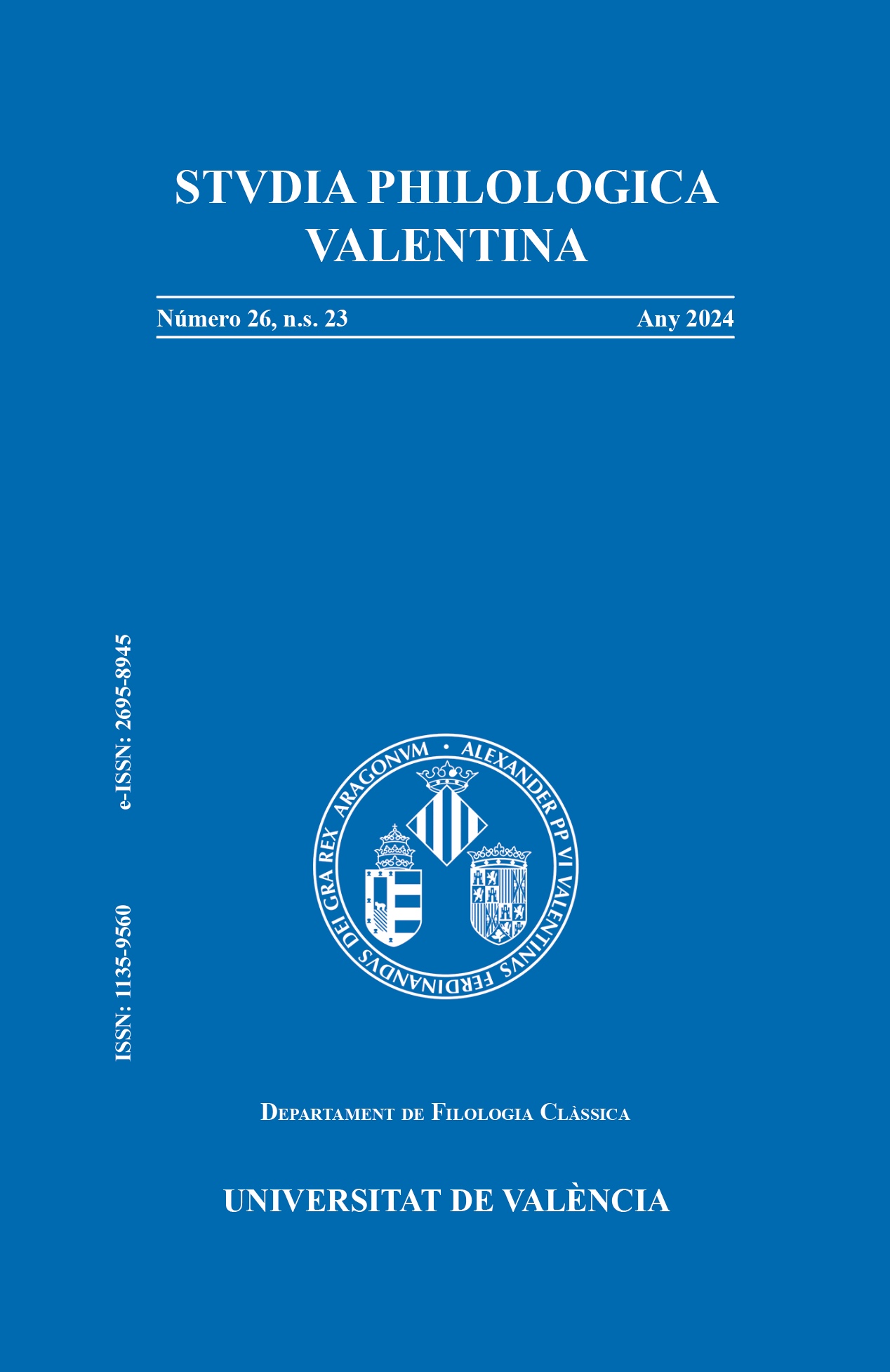Interrogativas indirectas con μή e indicativo en la medicina griega: un rasgo de empatía
DOI:
https://doi.org/10.7203/SPhV.26.28173Paraules clau:
Indirect interrogative sentence, ?? Indicative, Hippocratic corpus, Galen Resum
Resum
Los médicos griegos utilizan ocasionalmente una interrogativa indirecta introducida por μή y seguida de indicativo para indagar sobre un síntoma desfavorable del enfermo («Pregunto, pues metemo que tiene ...»). Expresan de este modo su rechazo a la probable gravedad del paciente, dando asímuestras de empatía.
 Descàrregues
Descàrregues
 Referències
Referències
Acken, A.F. (1861), Die Grundzüge der Lehre von Tempus und Modus in Griechischen, Rostock.
Arskieva, Z. (2019), Empathy as a component of pedagogical optimism development, SHS Web of Conferences, 70.
Barigazzi, A. (1991), Galeni De optimo docendi genere, Exhortatio ad medicinam (Protrepticus), edidit et in linguam Italicam vertit, CMG V 1,1, Berlin 1991
Brief, S. (1890-1892), Die Conjunctionen bei Polybius, 3 vols., Viena, Verlag des K.K. Staatsgymnasiums.
T. Büttner-Wobst, T., (1962-1967), Polybii historiae, vols. 1-4, Leipzig: Teubner, 1889-1904 (reimp. 1962-1967).
Catuara, S. (2020), Las neuronas espejo : aprendizaje, imitación y empatía, Barcelona, EMSE.
Crespo, Emilio, et alii (2003), Sintaxis del griego clásico, Madrid, Gredos.
De Decker, Filip (2022), “The difference between the optative and the "modal" indicative in Homeric Greek, investigated in four case studies, part 2: the indicative and the εἰ μή-clauses”, Studia Linguistica Universitatis Iagellonicae Cracoviensis 139: 301–328.
DEREBOY, Ç. et alii (2005), “Teaching Empathy in Medical Education”, Turkish Journal of Psychiatry 16, 1-6.
Dickson, K. (1998), Stephanus medicus in Galeni ad Glauconem de medendi methodo librum primum, Leiden - Boston - Nueva York.
Dietz, F. R. (1966), Scholia in Hippocratem et Galenum, vol. 1, Königsberg: Borntraeger, 1834 (repr. Amsterdam: Hakkert, 1966).
Diggle, J. (1984), Euripidis fabulae, I, Oxford.
Ermerins, Franz Zacharias (éd.) (1864), Hippocratis et aliorum medicorum veterum reliquiae, volumen tertium, Traiecti ad rhenum apud Kemink et Filium.
Foucault, J. (1972), Recherches sur la langue et le style de Polybe, Paris, Les Belles-Lettres.
Goetzeler, l. (1887), De Polybi elocutione: dissertatio inauguralis, Typis et Sumptibus Stahelianis.
Horrocks, G. (2014), “Ouk ´Ismen Oudén: Negative Concord and Negative Polarity in the History of Greek”, Journal of Greek Linguistics, 14, 43-86.
Hossain, Md M. — Blanco, E. (2022), «A Question-Answer Driven Approach to Reveal Affirmative Interpretations from Verbal Negations», Available via license: CC BY 4.0
Index Hippocraticus = Kühn, J.-H., Fleischer, U. et alii (1986-1989), Anastassiou, A., Irmer, D. (1999) y (2007), Anastassiou, A. (2014).
Jerram, C.S. (1907), Euripides. Heraclidae, Oxford.
Jiménez López, D. (2022), (coord.), Sintaxis del griego antiguo, CSIC, Madrid.
Jouanna, J. (1992), Hippocrate, París, Fayard.
Kühn, C.G. (1821-1833), Claudii Galeni opera omnia / editionem curavit, Leipzig.
Littré, É (1839-1861), Hippocrates. Opera omnia, 10 vols., París.
Martí, A. (2016), «La negación en español: análisis y tipología de patrones de negación», Procesamiento del Lenguaje Natural, 57, 41-48.
Mayser, Edwin (1926-1934), Grammatik der griechischen Papyri aus der Ptolemäerzeit mit Einschluss der gleichzeitigen Ostraka und der in Ägypten verfassten Inschriften. II Satzlehre, Berlin, De Gruyter.
Mau. J. -- Mutschmann, H. (1914, 1961), Sexti Empirici opera, vols. 2 & 3, 2nd edn., Leipzig: Teubner.
Muchnová, D. (2014), „Negation“ and „Negation (morphology)“, en G. Giannakis et al. (Eds.), Encyclopedia of Ancient Greek Language and Linguistics, Leiden: Brill, (pp. 484–491 and 491–492).
Muchnová, D. (2016), «Negation in Ancient Greek: a Typological Approach», Graeco-Latina Brunensia 21, 2016 / 2, 183-200.
Nieto Izquierdo, E. (2019), « La phrase interrogative totale dans les lamelles oraculaires de —Dodone et dans les dialectes doriens », Lingvarvm Varietas, 8, 107-118.
Potter, P. (2010), Hippocrates, IX, Cambridge (Massachusetts) ; London : Harvard University Press.
Revuelta, A. (2022a), «Los Adverbios, Partículas e Interjecciones: de la oración al discurso», en Jiménez López, D. (coord.), en: Sintaxis del griego antiguo, CSIC, Madrid, pp. 491-555.
Revuelta, A. (2022b), «La negación», en Jiménez López, D. (coord.), en: Sintaxis del griego antiguo, CSIC, Madrid, pp. 723-764.
Taboada, M., et alii (2011), «Tratamiento sintáctico de la negación en análisis del sentimiento monolingüe y multilingüe», Computational Linguistics, 37(2), 267–307.
Thumiger, Chiara (2018), ‘The professional audiences of the Hippocratic Epidemics. Patient cases, in ancient scientific communication’, en: Petros Bouras-Vallianatos and Sophia Xenophontos, Greek Medical Literature and its Readers. From Hippocrates to Islam and Byzantium, New York, Routledge, 48-64.
TLG = Thesaurus Linguae Graecae (http://stephanus.tlg.uci.edu/)
Wehrli, F. (1969), Klearchos [Die Schule des Aristoteles vol. 3, 2nd edn.. Basel: Schwabe], 9-40.
Wenkebach, E. (19562), Galeni In Hippocratis Epidemiarum librum VI commentaria I-VI, edidit E. Wenkebach; commentaria VI-VIII, in Germanicam linguam transtulit F. Pfaff, editio altera lucis ope expressa, CMG V 10,2,2, Berlin.
Willis, D. et al. (2013), The History of Negation in the Languages of Europe and the Mediterranean, Oxford: Oxford University Press.
Willmott, J. (2013), «Negation in the history of Greek», en D. Willis et al. (Eds.), The History of negation in the languages of Europe and the Mediterranean, Oxford: Oxford University Press, I 299–340.
Ziegler, K. (1969), Plutarchi vitae parallelae, vol. 1.1, 4th edn., Leipzig: Teubner.
Descàrregues
Publicades
Com citar
-
Resum0
-
PDF (Español)0
Número
Secció
Llicència
Drets d'autor (c) 2025 Elsa García Novo

Aquesta obra està sota una llicència internacional Creative Commons Reconeixement-NoComercial-CompartirIgual 4.0.
![]()
Aquesta obra està sota una llicència Creative Commons Reconocimiento-NoComercial-CompartirIgual 4.0 Internacional.



